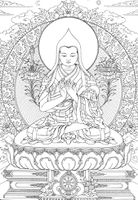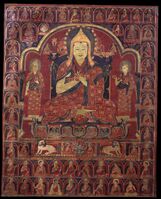Tsong kha pa: Difference between revisions
No edit summary |
No edit summary |
||
| Line 5: | Line 5: | ||
|HasDnzPage=Yes | |HasDnzPage=Yes | ||
|HasBnwPage=Yes | |HasBnwPage=Yes | ||
|MainNamePhon=Tsongkhapa | |MainNamePhon=Tsongkhapa | ||
|MainNameTib=ཙོང་ཁ་པ་ | |MainNameTib=ཙོང་ཁ་པ་ | ||
|MainNameWylie=tsong kha pa | |MainNameWylie=tsong kha pa | ||
|PersonType=Classical Tibetan Authors | |||
|images=File:Tsongkhapa (R. Beer).jpg{{!}}Line Drawing by Robert Beer Courtesy of [http://www.tibetanart.com/ The Robert Beer Online Galleries] | |||
File:Tsongkhapa - HAR.jpg | |||
|BdrcLink=https://www.tbrc.org/#!rid=P64 | |||
|TolLink=http://www.treasuryoflives.org/biographies/view/Tsongkhapa-Lobzang-Drakpa/8986 | |||
|tolExcerpt=Tsongkhapa Lobzang Drakpa was one of the most influential Tibetan Buddhist scholars of the last millennium. Born in Amdo, he travelled to U-Tsang in his youth, never to return to his homeland. In U-Tsang he studied with numerous teachers of all traditions and engaged in many retreats resulting in his development of a fresh interpretation of Nāgārjuna's Madhyamaka view and a reinvigoration of the monastic Vinaya. Widely regarded as an emanation of Mañjuśrī, Tsongkhapa composed eighteen volumes of works of which the majority dealt with tantric subjects. He was the founder of Ganden Monastery, which became the central monastery of the Geluk tradition that was founded on his teachings and writings. | |||
|HarLink=https://www.himalayanart.org/search/set.cfm?setID=197 | |||
|AltNamesWylie=tsong kha pa blo bzang grags pa; blo bzang grags pa'i dpal; blo bzang grags pa; | |AltNamesWylie=tsong kha pa blo bzang grags pa; blo bzang grags pa'i dpal; blo bzang grags pa; | ||
|AltNamesTib=ཙོང་ཁ་པ་བློ་བཟང་གྲགས་པ་; བློ་བཟང་གྲགས་པའི་དཔལ་; བློ་བཟང་གྲགས་པ་ | |AltNamesTib=ཙོང་ཁ་པ་བློ་བཟང་གྲགས་པ་; བློ་བཟང་གྲགས་པའི་དཔལ་; བློ་བཟང་གྲགས་པ་ | ||
| Line 16: | Line 21: | ||
|BornIn=tsong kha (Amdo) | |BornIn=tsong kha (Amdo) | ||
|TibDateGender=Female | |TibDateGender=Female | ||
|TibDateElement=Fire | |||
|TibDateAnimal=Bird | |||
|TibDateRabjung=6 | |||
|TibDateDeathGender=Female | |TibDateDeathGender=Female | ||
|TibDateDeathElement=Earth | |TibDateDeathElement=Earth | ||
|TibDateDeathAnimal=Pig | |TibDateDeathAnimal=Pig | ||
|TibDateDeathRabjung=7 | |TibDateDeathRabjung=7 | ||
|ReligiousAffiliation=Geluk | |ReligiousAffiliation=Geluk | ||
|ClassicalProfAff=Ganden Monastery | |ClassicalProfAff=Ganden Monastery | ||
|StudentOf=bsod nams rgyal mtshan; Red mda' ba gzhon nu blo gros; Nya dbon kun dga' dpal; Phyogs las rnam rgyal; sgra tshad pa rin chen rnam rgyal; Karmapa, 4th | |StudentOf=bsod nams rgyal mtshan; Red mda' ba gzhon nu blo gros; Nya dbon kun dga' dpal; Phyogs las rnam rgyal; sgra tshad pa rin chen rnam rgyal; Karmapa, 4th | ||
|TeacherOf='gos lo tsA ba gzhon nu dpal; mkhas grub rje; Rgyal tshab rje dar ma rin chen; spyan nga bsod nams bzang po | |TeacherOf='dul 'dzin grags pa rgyal mtshan; 'gos lo tsA ba gzhon nu dpal; 'jam dbyangs chos rje bkra shis dpal ldan; mkhas grub rje; Rgyal tshab rje dar ma rin chen; spyan nga bsod nams bzang po | ||
|BiographicalInfo=*Assumes office 1409 dga' ldan dgon (stag rtse rdzong) | |BiographicalInfo=*Assumes office 1409 dga' ldan dgon (stag rtse rdzong) | ||
| Line 34: | Line 39: | ||
*Final Ordination 1381 yar klung rnam rgyal dgon | *Final Ordination 1381 yar klung rnam rgyal dgon | ||
|BnwShortPersonBio=Tsongkhapa Lobzang Drakpa was one of the most influential Tibetan Buddhist scholars of the last millennium. Born in Amdo, he travelled to U-Tsang in his youth, never to return to his homeland. In U-Tsang he studied with numerous teachers of all traditions and engaged in many retreats resulting in his development of a fresh interpretation of Nāgārjuna's Madhyamaka view and a reinvigoration of the monastic Vinaya. Widely regarded as an emanation of Mañjuśrī, Tsongkhapa composed eighteen volumes of works of which the majority dealt with tantric subjects. He was the founder of Ganden Monastery, which became the central monastery of the Geluk tradition that was founded on his teachings and writings. | |BnwShortPersonBio=Tsongkhapa Lobzang Drakpa was one of the most influential Tibetan Buddhist scholars of the last millennium. Born in Amdo, he travelled to U-Tsang in his youth, never to return to his homeland. In U-Tsang he studied with numerous teachers of all traditions and engaged in many retreats resulting in his development of a fresh interpretation of Nāgārjuna's Madhyamaka view and a reinvigoration of the monastic Vinaya. Widely regarded as an emanation of Mañjuśrī, Tsongkhapa composed eighteen volumes of works of which the majority dealt with tantric subjects. He was the founder of Ganden Monastery, which became the central monastery of the Geluk tradition that was founded on his teachings and writings. | ||
|BuNayDefProvComplex=No | |||
|PosWheelTurn=Second Turning | |PosWheelTurn=Second Turning | ||
|BuNayWheelTurnComplex=No | |||
|PosWheelTurnNotes=Wangchuk quotes mkhas grub rje as stating, "In our system, Jé Rinpoché (rje rin po che, that is, Tsongkhapa) mentions that the ''Uttaratantra'' primarily comments on the meaning of those sutras that are in conformity with the middle-wheel teachings, such as the Tathāgatagarbhasūtra, Samādhirājasūtra, Jnānālokasūtra, Aṅgulimālāsūtra, Śrīmālādevīsūtra, and so forth." [[Wangchuk, Tsering]], ''[[The Uttaratantra in the Land of Snows]]'', p. 89. | |PosWheelTurnNotes=Wangchuk quotes mkhas grub rje as stating, "In our system, Jé Rinpoché (rje rin po che, that is, Tsongkhapa) mentions that the ''Uttaratantra'' primarily comments on the meaning of those sutras that are in conformity with the middle-wheel teachings, such as the Tathāgatagarbhasūtra, Samādhirājasūtra, Jnānālokasūtra, Aṅgulimālāsūtra, Śrīmālādevīsūtra, and so forth." [[Wangchuk, Tsering]], ''[[The Uttaratantra in the Land of Snows]]'', p. 89. | ||
|PosYogaMadhya=Madhyamaka | |PosYogaMadhya=Madhyamaka | ||
|BuNayYogaMadhyaComplex=No | |||
|PosYogaMadhyaNotes=Note that Wangchuk maintains that he developed this certainty later in his career. | |PosYogaMadhyaNotes=Note that Wangchuk maintains that he developed this certainty later in his career. | ||
*He quotes his ''Golden Rosary of Excellent Exposition'' as stating that the Mind-Only presentation of buddha-nature as, "the viewpoint explicated in the ''Uttaratantra''." [[Wangchuk, Tsering]], ''[[The Uttaratantra in the Land of Snows]]'', p. 90. | *He quotes his ''Golden Rosary of Excellent Exposition'' as stating that the Mind-Only presentation of buddha-nature as, "the viewpoint explicated in the ''Uttaratantra''." [[Wangchuk, Tsering]], ''[[The Uttaratantra in the Land of Snows]]'', p. 90. | ||
*Though he later quotes his presumably final stance as: "In his ''Illuminating the Thoughts of the Madhyamaka'', Tsongkhapa clearly states, "The great master Asaṅga also did not explain the ''Uttaratantra'' according to the Cittamātra School, rather he explicated it according to the Madhyamaka School." [[Wangchuk, Tsering]], ''[[The Uttaratantra in the Land of Snows]]'', p. 93. | *Though he later quotes his presumably final stance as: "In his ''Illuminating the Thoughts of the Madhyamaka'', Tsongkhapa clearly states, "The great master Asaṅga also did not explain the ''Uttaratantra'' according to the Cittamātra School, rather he explicated it according to the Madhyamaka School." [[Wangchuk, Tsering]], ''[[The Uttaratantra in the Land of Snows]]'', p. 93. | ||
|PosZhenRang=Rangtong | |PosZhenRang=Rangtong | ||
|BuNayZhenRangComplex=No | |||
|BuNayVehiclesComplex=No | |||
|BuNayAnalyticMeditComplex=No | |||
|PosEmptyLumin=Tathāgatagarbha as the Emptiness That is a Non-implicative Negation (without enlightened qualities) | |PosEmptyLumin=Tathāgatagarbha as the Emptiness That is a Non-implicative Negation (without enlightened qualities) | ||
|BuNayEmptyLuminComplex=No | |||
|IsInGyatsa=No | |IsInGyatsa=No | ||
|PosSvataPrasa=Prāsaṅgika (ཐལ་འགྱུར་) | |PosSvataPrasa=Prāsaṅgika (ཐལ་འགྱུར་) | ||
Revision as of 04:00, 28 June 2021
| PersonType | Category:Classical Tibetan Authors |
|---|---|
| MainNamePhon | Tsongkhapa |
| MainNameTib | ཙོང་ཁ་པ་ |
| MainNameWylie | tsong kha pa |
| AltNamesTib | ཙོང་ཁ་པ་བློ་བཟང་གྲགས་པ་ · བློ་བཟང་གྲགས་པའི་དཔལ་ · བློ་བཟང་གྲགས་པ་ |
| AltNamesWylie | tsong kha pa blo bzang grags pa · blo bzang grags pa'i dpal · blo bzang grags pa |
| BiographicalInfo |
|
| YearBirth | 1357 |
| YearDeath | 1419 |
| BornIn | tsong kha (Amdo) |
| TibDateGender | Female |
| TibDateElement | Fire |
| TibDateAnimal | Bird |
| TibDateRabjung | 6 |
| TibDateDeathGender | Female |
| TibDateDeathElement | Earth |
| TibDateDeathAnimal | Pig |
| TibDateDeathRabjung | 7 |
| ReligiousAffiliation | Geluk |
| ClassicalProfAff | Ganden Monastery |
| StudentOf | bsod nams rgyal mtshan · Rendawa Zhönu Lodrö · Nyawön Kunga Pal · Chokle Namgyal · sgra tshad pa rin chen rnam rgyal · Fourth Karmapa Rolpai Dorje |
| TeacherOf | 'dul 'dzin grags pa rgyal mtshan · Gö Lotsāwa Zhönu Pal · Jamyang Chöje Tashi Palden · mkhas grub rje · Gyaltsap Je Dharma Rinchen · spyan nga bsod nams bzang po |
| BDRC | https://www.tbrc.org/#!rid=P64 |
| Treasury of Lives | http://www.treasuryoflives.org/biographies/view/Tsongkhapa-Lobzang-Drakpa/8986 |
| Himalayan Art Resources | https://www.himalayanart.org/search/set.cfm?setID=197 |
| IsInGyatsa | No |
| BnwShortPersonBio | Tsongkhapa Lobzang Drakpa was one of the most influential Tibetan Buddhist scholars of the last millennium. Born in Amdo, he travelled to U-Tsang in his youth, never to return to his homeland. In U-Tsang he studied with numerous teachers of all traditions and engaged in many retreats resulting in his development of a fresh interpretation of Nāgārjuna's Madhyamaka view and a reinvigoration of the monastic Vinaya. Widely regarded as an emanation of Mañjuśrī, Tsongkhapa composed eighteen volumes of works of which the majority dealt with tantric subjects. He was the founder of Ganden Monastery, which became the central monastery of the Geluk tradition that was founded on his teachings and writings. |
| PosWheelTurn | Second Turning |
| PosWheelTurnNotes | Wangchuk quotes mkhas grub rje as stating, "In our system, Jé Rinpoché (rje rin po che, that is, Tsongkhapa) mentions that the Uttaratantra primarily comments on the meaning of those sutras that are in conformity with the middle-wheel teachings, such as the Tathāgatagarbhasūtra, Samādhirājasūtra, Jnānālokasūtra, Aṅgulimālāsūtra, Śrīmālādevīsūtra, and so forth." Wangchuk, Tsering, The Uttaratantra in the Land of Snows, p. 89. |
| PosYogaMadhya | Madhyamaka |
| PosYogaMadhyaNotes | Note that Wangchuk maintains that he developed this certainty later in his career.
|
| PosZhenRang | Rangtong |
| PosEmptyLumin | Tathāgatagarbha as the Emptiness That is a Non-implicative Negation (without enlightened qualities) |
| PosSvataPrasa | Prāsaṅgika (ཐལ་འགྱུར་) |
| PosSvataPrasaNotes | Wangchuk cites Tsongkhapa's students and commentators on this issue:
|
| Other wikis |
If the page does not yet exist on the remote wiki, you can paste the tag |


